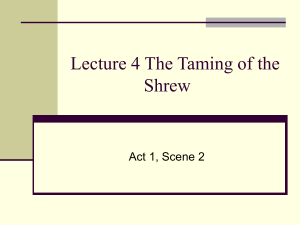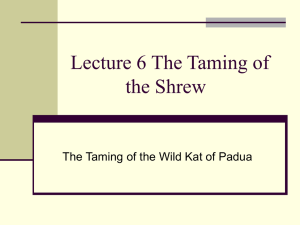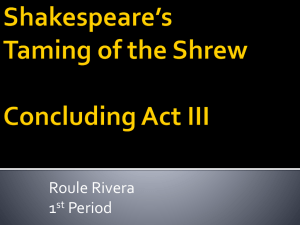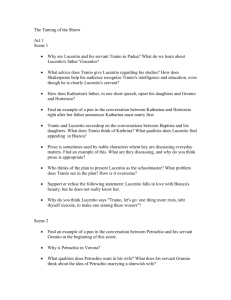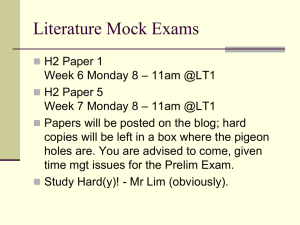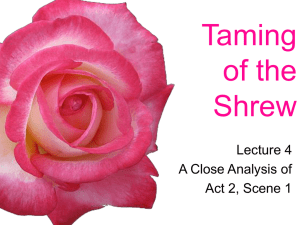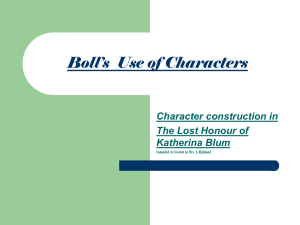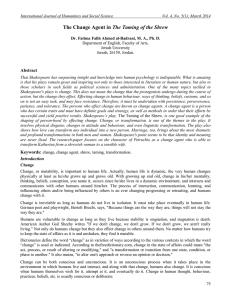Act 4 - Livre Or Die
advertisement
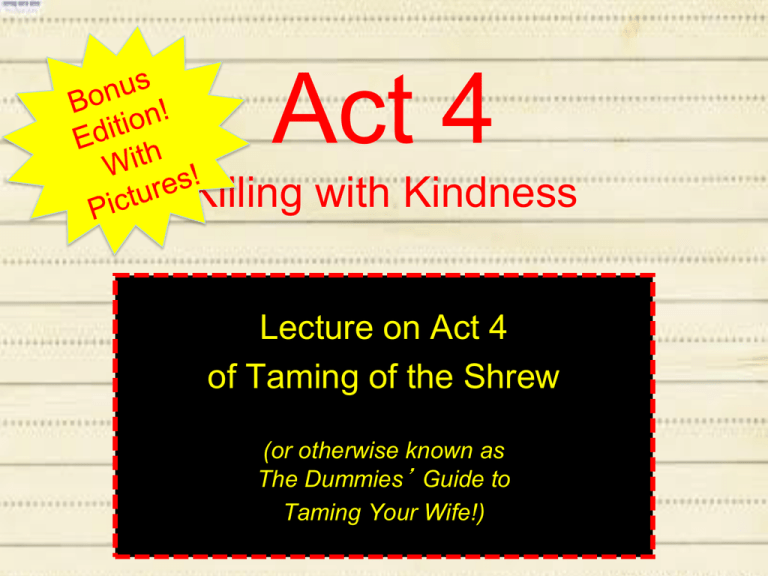
Act 4 Killing with Kindness Lecture on Act 4 of Taming of the Shrew (or otherwise known as The Dummies’ Guide to Taming Your Wife!) Agenda • Overview of Act 4: Plot and Structure • Petruchio VS Katherina • Lucentio VS Hortensio – These scenes surface power struggles, deception and manipulation of identities and roles – Also note the literary devices and techniques that surface these themes and develop characterisation Act 4 Scene Breakdown • Five scenes in Act 4 • Odd numbered scenes (1, 3 and 5): – Main plot - Petruchio & Katherina – These scenes will be analysed together because they portray Petruchio’s taming of Katherina • Even numbered scenes (2 and 4): – Subplot – Lucentio & Bianca Scenes One, Three & Five Module #101 on Taming your Wife. Shame, Humiliate, Shame. 12 Essential Lessons. Petruchio VS Katherina • Scene 1: Describes Katherina’s first day spent in Petruchio’s house. • Note the setting “Petruchio’s country house” • Scenes should not be read independently – consider the shift from the chaotic “mad marriage” in the previous scene to the domestic space of Petruchio’s house • Conventions of “happily ever afters” do not apply here, at least not for now Thematic Concerns in these scenes • Social hierarchy, • Petruchio’s absolute linguistic power in his marriage • Violence– Domestic violence? Abuse? • Forced submission of wife – a necessary and socially expected venture? • Power dynamics between husband and wife • Marriage #1 Shame her (in Public and at Home • Scene with servants – opens with Grumio and Curtis. Function of Grumio + Curtis – Consider the setting – Petruchio’s home where he is the ultimate master. – Note the shift in this scene from the public humiliation (the marriage) to the private humiliation (in the house, in the domestic sphere – depriving her of food and sleep – basic necessities) • Would you consider this domestic violence and abuse? Let her fall off a diseased horse & into mud • Dramatic Technique: Grumio functions as the storyteller and narrator (c/f 3.2.161 where he narrates the story of their “mad marriage”.) • Here he informs Curtis, his fellow servant, of their wretched journey back. Amplifies the actual experience as audience is left to imagine it. – 4.1.1 He also mentions how he was beaten by Petruchio, a prelude to what will occur later in this scene – and makes audience anticipate further violence (Effects) Lecture her on selfcontrol after acting like a deranged mad man – Dramatic Technique : Curtis: Also functions as storyteller when narrating what happens in their private chambers and allows audience to further imagine Petruchio’s psychological torture of her – “Making a sermon of continency to her,/ And rails and swears and rates, that she, poor soul,/ Knows not which way to stand, to look, to speak,/ And sits as one new-risen from dream.” 4.1.165 • Power dynamics between husband and wife – ironic that he is lecturing her on self-control when he just displayed an utter lack of self restraint in hitting his servants – Her apparent powerlessness and silence (a stark contrast to her earlier banter) also signals a shift in her behaviour and the success of Petruchio’s taming. Show her you are capable of violence without laying a finger on her. (do NOT beat her as you are a gentleman) • Heightened dramatic action and violence: Petruchio strikes his servants more than once and is harsh and brutal. – 4.1.130 He strikes – 4.1.138 strikes – till Katherine attempts to intervene. • Effect: enhances farce and therefore downplays the emotional and psychological violence that Katherina experiences through Petruchio’s words and behaviour Confuse her and make members of her side with the your household (that is half the battle won) • Petruchio’s dialogue: alternates between addressing servants (swearing harshly) and Katherina (affectionately) • His dialogue is interlaced with stage directions that indicate violence • 4.1.134 One, Kate, that you must kiss and be acquainted with. / Where are my slippers? Shall I have some water?/Come, Kate and wash, and welcome heartily/ You whoreson villain! Will you let it fall?” – He strikes the Servant • Effect: Asserting his mastery Confuse her and make members of her side with the your household (that is half the battle won) • Effect: confusion on Katherina’s part whilst the audience may laugh at this comic effect/farce whilst a more discerning reader or audience may consider Petruchio’s taming technique immensely brutal and cruel • Thus the threat of violence always hangs in the air even though he does not hit Katherina – which brings us to the point of domestic violence within the patriarchal framework of marriage. Ensure you have a plan. • Petruchio’s soliloquy and his diction reveal to us the power dynamics in the marriage and the absolute control that he wields (or desires to wield over Katherina) – “Thus have I politicly begun my reign.” 4.1.170 • There is a method to his madness – c/f: mad marriage in the previous scene where Tranio declares – “Upon my life, Petruchio means but well” 3.2.22 Ensure you have a plan. • Petruchio is shrew and this is reinforced by Curtis commenting that – “By this reckoning he is more shrew than she.” 4.1.72. • Here, as an aside he details exactly what his method of taming would be. One of the most memorable lines would be how he proclaims that – “This is a way to kill a wife with kindness” 4.1.190’ • Even though kill her is used as a metaphor for he surely does not intend to take her life, a picture of violence is immediately painted • He does, however, want to kill the “Wild Kate” Soliloquize your Plan Last night she slept, nor tonight she shall not. As with the meat, some undeserved fault I’ll find about the making of the bed, And here I’ll fling the pillow, there the bolster, This way the coverlet, another way the sheets. Ay, and amid this hurly I intend That all is done in revered care of her. And in, conclusion she shal watch all night, And if she chance to nod I’ll rail and brawl And with the clamour keep her still This is a way to kill a wife with kindness, And thus I’ll curb her mad and headstrong humour. He that knows better how to tame a shrew, Now let him speak – ‘tis charity to show. 4.1.180-193 Soliloquize your Plan • A closer look at his soliloquy reveals the exact techniques that he proposes to employ • Dramatic effect of soliloquy? • Persuades the audience to his point of view • Provide them with foresight, and thus heighten their expectation • Reveal that reality is not what it appears to be Thematic Concerns: Domestic Violence • Critics are split over whether or not Petruchio’s method of taming amounts to domestic violence • Historical context: In the Elizabethan period, shrewtaming narratives often involved the beating and humiliation of women (verbal and physical abuse). • Note, even the threat of death hovers in the air with the mention of “kill” in Petruchio’s lines ‘This is a way to kill a wife with kindness” L-190 • and Katherina appealing to Grumio in Scene 3, where she says “’Twere deadly sickness or else present death” should she not get any more sleep or eat.” Thematic Concerns: Domestic Violence • Severity of abuse undermined by the farcical dramatic action but by laughing along, is not the audience also complicit in Petruchio’s taming? Thus indicating that the audience shares in the play’s patriarchal assumptions? • How do we rate the severity of abuse? Imagine you are a hawk trainer (Your wife is the wild hawk that ought to be tamed. Tsk.) – One may then argue if this “new-and-improved” shrew taming method is more acceptable. Let us take a closer look at his speech: • “My falcon now is sharp and passing empty,/ And till she stoop she must not be full-gorged” 170 – Speech is filled with hawking metaphor and imagery: directly linked to taming – Animal imagery: refers to Katherina as falcon, haggard, kite that bate and beat whilst he is the “keeper”, the master » The power dynamics between husband and wife is clear »Link to Induction? Insist that it is for her own good. • Taming is also done for her own good. Brings us back to shrew taming narratives and social norms – where a wife has to be tamed for her own well-being. – “That al is done in reverend care of her” 4.1.186 • Interesting as it appears to be a self-reflexive, ironic nod to societal norms because here Petruchio declares that he “intends” i.e. pretends. • Katherina confirms this in Scene 3 when she says, “He does it under name of perfect love.” Consider the ending of the play then. Scene 3 • Plot: Grumio + Katherina: Katherina confides in Grumio and pleads for food from him. He refuses. • Petruchio and Hortensio enter with meat and the former continues to taunt her with it. • Tailor and Haberdasher enter with a gown and cap respectively that Katherina likes but Petruchio turns them away despite Katherina’s insistence that she likes them. • Is this and can this be considered abuse? Deny her of food & finery • Aware of social expectations and norms where Katherina does belong to a noble family and would thus naturally desire a beautiful gown and cape (is she then that much of an outsider as we first perceive her to be?) • The deprivation of such finery is Petruchio’s way of blackmailing her into submission Questions • Although he does not beat her, and is apparently more civilized since Katherina has made it clear earlier that gentlemen who are civil will not hit a woman, is this then a new and improved way of taming one’s wife? • Does this make it more acceptable? • Can it then be considered non-violent? Many critics argue that this is still violence as it damages her psychologically and forces her to relinquish her identity and spirit in order to live in harmony with Petruchio Scene 5: Moon, Sun, Moon. • Plot: Petruchio + Katherina + Hortensio are on the way to Baptista’s house where Petruchio insists that it is the moon that is shining when it is actually bright daylight. Mess with her sense of reality • Petruchio insists that day is night and an old man (Vincentio) is a young virgin woman • Katherina has to agree otherwise he would retract his offer of kindness (a visit to her father’s) • When he threatens to take her back to the isolation of his home, Kate shifts her strategies and decides not to cross him, saying instead: “What you will have it nam’d, even that it is And so it shall be so for Katherine.” 4.5.21 • It may be argued that what she has undergone is abusive as this signifies Petruchio’s domination over her speech and actions – ultimately reaching fruition in her final speech (emotional & verbal abuse) Shame, Humiliate, Shame. • At the core of all of these methods, one realises that shame and humiliation underlies each of his strategies • Consider the idea of shame and how Petruchio systematically ensures she is humiliated and shamed in both the public and the domestic sphere, breaking her will and eventually, blurring her sense of identity and reality • Even if she is playing along, critics argue that she has to behave and submit to Petruchio in order to survive and live in harmony Scenes 2 and 4 The Sub Plot Hortensio. Bianca. Lucentio. Scene 2: Face Off VS Scene 2: Face Off • • • • • Subplot: Hortensio Withdraws from the Courting of Bianca Lucentio + Tranio [Team Lucentio] Hortensio [Team Hortensio] Think about teams because of their various strategies and supporting team members Or, who are accomplices in the plan to deceive Baptista Scene 2: Face Off • Winner: Team L. Why does Hortensio withdraw? He is put off by Bianca’s ease in falling in love with ‘Cambio’ – his resentment towards Bianca is clear in his words – “But do forswear her/ As one unworthy all the former favours” 4.2.29 • He refers to her as a “proud disdainful haggard” – irony and is now unworthy. Note and comment on the irony? • Why? Bianca does not fit his expectations of an ideal wife and he vows to marry a widow instead. • Or is he simply wounded? Themes • C/F: – Themes: • Societal Expectations and Roles of Women – contrast with Katherina and Bianca, men decide what is acceptable in a woman. • Love and Romance – contrast with Petruchio’s wooing of Katherina. Scene 4: Enter “Vincentio” • Subplot: Lucentio’s ‘father’ appears and makes a deal with Baptista, sealing the marriage proposal • Again, Lucentio is not directly involved in the marriage transaction here and thus the concept of Lucentio marrying for love and romance is still sustained, as opposed to Petruchio’s one motive. Scene 4: Enter “Vincentio” • This time, Bianca is complicit in Lucentio’s plan to deceive her father. Thematic concerns reinforced: • Marriage as trade, as a market, • Also, Deception, Appearance and Reality, Roles and Identities Common Test Pointers: • Read the question and understand its requirements • Formulate a strong & balanced thesis • Plan your arguments (soliloquize it internally if you must) • Make a Point • Provide Evidence • Analyse and Evaluate your Evidence
